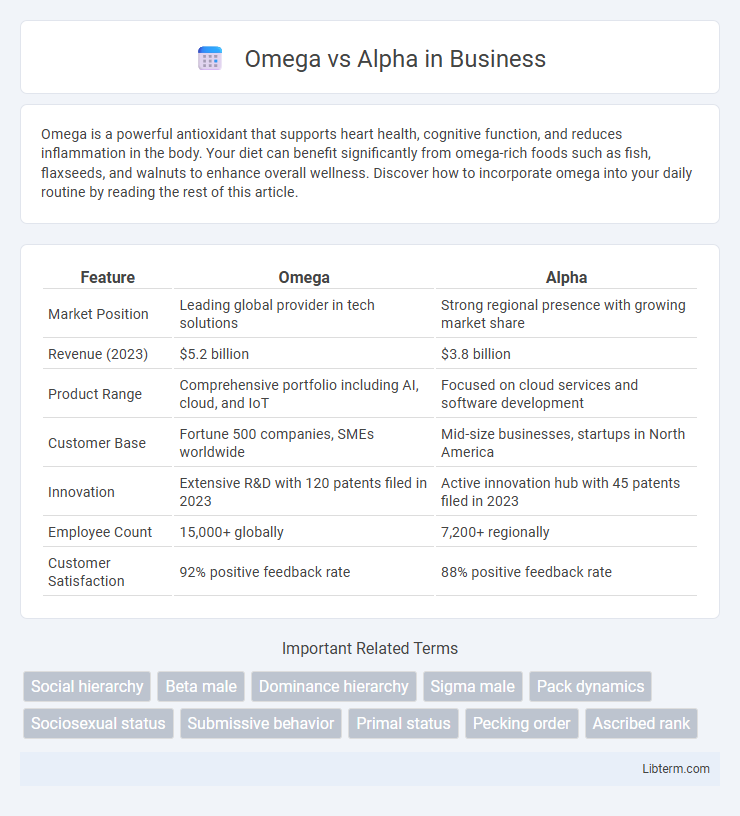Omega is a powerful antioxidant that supports heart health, cognitive function, and reduces inflammation in the body. Your diet can benefit significantly from omega-rich foods such as fish, flaxseeds, and walnuts to enhance overall wellness. Discover how to incorporate omega into your daily routine by reading the rest of this article.
Table of Comparison
| Feature | Omega | Alpha |
|---|---|---|
| Market Position | Leading global provider in tech solutions | Strong regional presence with growing market share |
| Revenue (2023) | $5.2 billion | $3.8 billion |
| Product Range | Comprehensive portfolio including AI, cloud, and IoT | Focused on cloud services and software development |
| Customer Base | Fortune 500 companies, SMEs worldwide | Mid-size businesses, startups in North America |
| Innovation | Extensive R&D with 120 patents filed in 2023 | Active innovation hub with 45 patents filed in 2023 |
| Employee Count | 15,000+ globally | 7,200+ regionally |
| Customer Satisfaction | 92% positive feedback rate | 88% positive feedback rate |
Defining Omega and Alpha Personalities
Alpha personalities exhibit dominant, confident traits characterized by leadership skills, assertiveness, and high social status, often thriving in competitive environments. Omega personalities are identified by their independence, self-reliance, and introverted nature, often rejecting traditional social hierarchies and valuing autonomy over dominance. The distinction between Omega and Alpha lies in their contrasting approaches to social power, with Alphas seeking control and Omegas prioritizing freedom and authenticity.
Key Traits of Omega Individuals
Omega individuals exhibit independence, self-confidence, and resilience, often thriving outside traditional social hierarchies. They prioritize personal values over status, displaying creativity and strong problem-solving skills. Unlike Alpha personalities, Omegas are introspective and adaptable, valuing authenticity and meaningful connections.
Distinct Characteristics of Alpha Personalities
Alpha personalities exhibit strong leadership qualities, characterized by confidence, decisiveness, and a natural ability to influence others. They often display high levels of ambition and assertiveness, driving them to seek control and success in social and professional environments. These individuals prioritize goal achievement and are comfortable taking risks, setting them apart from Omega personalities who tend to be more introspective and non-competitive.
Social Dynamics: Omegas vs Alphas
Alphas dominate social hierarchies by asserting confidence, leadership, and decisiveness, often influencing group behavior and status. Omegas, on the other hand, operate outside traditional dominance structures, exhibiting independence, nonconformity, and emotional intelligence that allow them to navigate social dynamics without direct competition. While Alphas excel in control and visibility, Omegas leverage adaptability and unique social roles to maintain equilibrium within complex group interactions.
Leadership Styles: Alpha vs Omega
Alpha leadership style emphasizes dominance, assertiveness, and confidence, often driving decision-making through control and a clear hierarchy. Omega leadership, by contrast, prioritizes empathy, collaboration, and adaptability, fostering a supportive environment where team members' input shapes outcomes. Both styles influence organizational culture distinctly, with Alpha leaders steering through authority while Omega leaders inspire through inclusivity and emotional intelligence.
Attraction and Relationships: Alpha and Omega Appeal
Alpha individuals often exhibit dominant traits such as confidence and leadership, which naturally attract partners seeking strength and security in relationships. Omega personalities, characterized by empathy and emotional intelligence, appeal to those valuing deep emotional connections and sensitivity. The dynamic between Alpha's assertiveness and Omega's nurturing nature creates a complementary balance that enhances attraction and fosters stable, fulfilling relationships.
Workplace Behavior: Omegas and Alphas Compared
Omega personalities exhibit independent and adaptable workplace behaviors, often thriving in non-hierarchical settings by valuing autonomy and collaboration. Alpha individuals tend to display dominant leadership traits, assertiveness, and a competitive drive, frequently seeking control and influence within organizational structures. The contrast in workplace behavior between Omegas and Alphas highlights how Omegas prefer cooperative problem-solving, while Alphas prioritize directive decision-making.
Strengths and Weaknesses of Each Personality
Omega personalities exhibit strong independence and creativity, excelling in self-motivation and unconventional problem-solving but may struggle with social dominance and assertiveness. Alpha personalities demonstrate leadership, confidence, and decisiveness, often thriving in competitive environments yet can face challenges with empathy and collaboration. Understanding these strengths and weaknesses aids in leveraging each personality type's unique contributions in team dynamics and personal growth.
Myths and Misconceptions: Alpha vs Omega
The myths surrounding Alpha and Omega personalities often exaggerate dominance and submission traits, inaccurately portraying Alphas as inherently aggressive leaders and Omegas as passive followers. Scientific studies in social psychology reveal that these labels oversimplify complex behavioral spectrums and ignore individual variability within social hierarchies. Misconceptions fueled by popular culture distort understanding, impeding recognition of adaptive social strategies exhibited by both Alpha and Omega types.
Finding Balance: Embracing Both Alpha and Omega Traits
Embracing both alpha and omega traits fosters a balanced approach to leadership and collaboration by integrating confidence with empathy. Alpha qualities like decisiveness and assertiveness complement omega traits such as adaptability and emotional intelligence, creating a dynamic synergy for effective communication and problem-solving. Cultivating this equilibrium enhances personal growth and promotes harmonious relationships in both professional and social environments.
Omega Infographic

 libterm.com
libterm.com